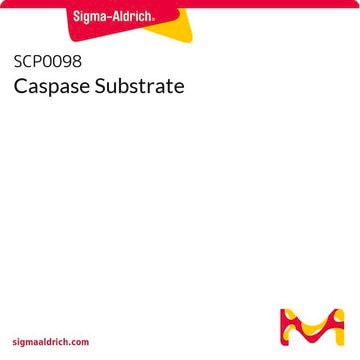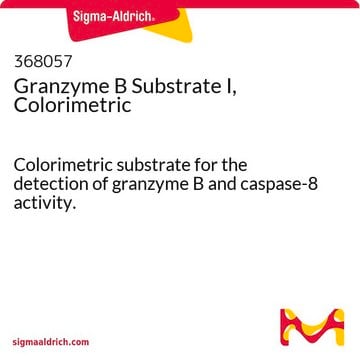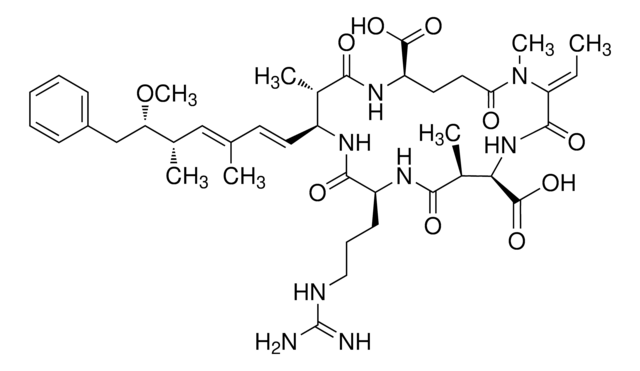SCP0221
Procaspase 3 Substrate
≥95% (HPLC), lyophilized
Sign Into View Organizational & Contract Pricing
All Photos(1)
About This Item
Empirical Formula (Hill Notation):
C29H34N5O12S1
Molecular Weight:
676.67
UNSPSC Code:
12352200
NACRES:
NA.32
Recommended Products
product name
Procaspase 3 Substrate,
Assay
≥95% (HPLC)
form
lyophilized
composition
Peptide Content, ≥77%
storage condition
protect from light
storage temp.
−20°C
Amino Acid Sequence
Ac-Glu-Ser-Met-Asp-AFC
Application
Procaspase 3 Substrate (Ac-ESMD-AFC) contains the target sequence for the proteolytic production of the p17 subunit of caspase 3 from its precursor (procaspase). Ac-ESMD-CHO inhibits this activity. Ac-ESMD-AFC may be used in comparison with other procaspase substrate and inhibitor peptides to differentiate proteolytic activity used for procaspase processing.
Storage Class Code
11 - Combustible Solids
WGK
WGK 1
Flash Point(F)
Not applicable
Flash Point(C)
Not applicable
Certificates of Analysis (COA)
Search for Certificates of Analysis (COA) by entering the products Lot/Batch Number. Lot and Batch Numbers can be found on a product’s label following the words ‘Lot’ or ‘Batch’.
Already Own This Product?
Find documentation for the products that you have recently purchased in the Document Library.
Dominique Le Goff et al.
Reproductive toxicology (Elmsford, N.Y.), 21(3), 329-334 (2005-11-02)
The aim of the present study was to determine whether or not apoptosis occurs in Sertoli cells in presence of 25-hydroxycholesterol, an oxysterol derived from cholesterol-containing foods or endogenous oxidation. Here, we provide evidence that 25-hydroxycholesterol can induce cultured Sertoli
A sequential two-step mechanism for the production of the mature p17:p12 form of caspase-3 in vitro.
Z Han et al.
The Journal of biological chemistry, 272(20), 13432-13436 (1997-05-16)
The apoptotic cysteine protease, caspase-3, is expressed in cells as an inactive 32-kDa precursor from which 17 kDa (p17) and 12 kDa (p12) subunits of the mature caspase-3 are proteolytically generated during apoptosis. Two amino acid sequences, ESMD downward arrowS
Johnson Agniswamy et al.
The FEBS journal, 274(18), 4752-4765 (2007-08-19)
Many protein substrates of caspases are cleaved at noncanonical sites in comparison to the recognition motifs reported for the three caspase subgroups. To provide insight into the specificity and aid in the design of drugs to control cell death, crystal
Our team of scientists has experience in all areas of research including Life Science, Material Science, Chemical Synthesis, Chromatography, Analytical and many others.
Contact Technical Service








